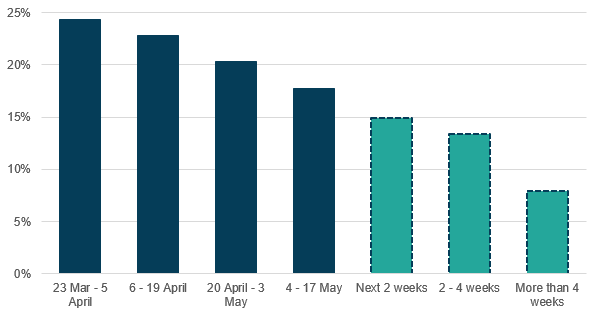Soft Service Costs Increased by 8% in 2024, Says Colliers
Colliers’ latest Occupier Cost Index shows costs remain out of step with occupancy, with soft services increasing by 8 per cent in 2024. The Occupier Cost Index...
Read Full Article
Since lockdown started to restrict our movements, the ONS has been monitoring the impact COVID-19 has had on UK businesses.
Let’s examine some of the key findings so far, and look to what these might indicate for Britain’s economy.
Shortly after social distancing measures were introduced, the ONS’ Business Impact of Coronavirus Survey (BICS) found that a quarter of UK businesses had temporarily closed or paused trading.
Since then that proportion has gradually declined to just under a fifth (18%) in the latest period.
The below chart shows the percentage of all responding businesses who have temporarily closed or paused trading by survey wave, and current expectations of restarting.

Picture: A bar chart showing a steady decline in UK businesses that have paused trading. All percentages are a proportion of the number of businesses who responded to each particular wave. Response rates can vary between waves which could impact on differences Expected restarting dates are based on final Wave 5 responses from the point of completion of the questionnaire (18 May to 31 May 2020)
This data reveals that:
In the latest BICS survey, respondents were asked how long they felt their enterprise’s cash reserves would last.
Four per cent said they had no cash reserves, with another four per cent saying they had less than one month’s reserves. However, over a fifth (23%) said they had enough for one to three months.
In total, almost one-third of UK businesses said they only had enough cash reserves to survive three months or less. Another quarter said they were not sure how long their cash reserves would last.
Accommodation, food services, arts, entertainment & recreation businesses were again most vulnerable, with over half of these businesses having three months or fewer in cash reserves to rely on.
The ONS has stated that they will continue to monitor businesses’ experiences closely and will update their questionnaire to capture how they are preparing to re-open.
Grant Fitzner, Chief Economist and Director of the ONS’ COVID-19 response offered some positive news regarding the business surveys:
“To date our business surveys have found only a very small proportion (0.5 per cent or less per survey wave) of businesses reporting that they had permanently ceased trading.
“But those firms who don’t consider they’re able to restart trading any time soon, or who have fast depleting cash reserves, face an uncertain future. How they fare will have consequences not just for their business and employees, but for the wider UK economy and society.
Picture: A photograph of an "Open" sign
Article written by Ella Tansley | Published 05 June 2020
Colliers’ latest Occupier Cost Index shows costs remain out of step with occupancy, with soft services increasing by 8 per cent in 2024. The Occupier Cost Index...
Read Full ArticleInsights from a global survey of nearly 11,000 office workers reveal the importance of engaging office environments & “purpose-driven”...
Read Full ArticleNew research from Colliers Workplace Advisory uses occupancy analytics to determine what influences office attendance. Watch the...
Read Full ArticleSince the UK’s first national lockdown, hybrid working has remained a talking point for businesses, and new data reveals which European countries love and hate...
Read Full ArticleQuarterly figures from Cluttons show the commercial property market’s continued strong recovery – but how long can this realistically last? Despite a...
Read Full ArticleOffice occupancy in the UK recently reached its highest percentage since the start of the pandemic. On Thursday 12 May 2022, office occupancy reached an average of 42...
Read Full ArticleCabinet minister Jacob Rees-Mogg, in a letter to cabinet colleagues, is urging civil servants to reduce how much time they spend working from home. In a letter...
Read Full ArticleIn terms of virus transmission risk, are there days that are “safer” to attend the workplace than others? According to the Infogrid Air Quality Index, only...
Read Full ArticleEmployees in England are no longer being asked to work from home, as the government removes Plan B rules. But is this change as simple as encouraging a mass return to the...
Read Full ArticleCOVID-19 testing has been suspended at a centre in Wolverhampton, after reports that up to 43,000 people may have been wrongly given negative results. The errors were...
Read Full Article